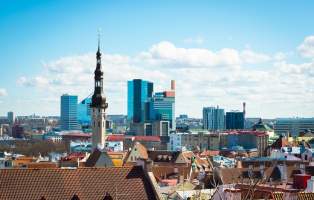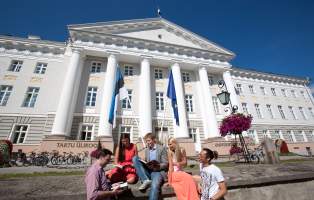Estonia has a relatively small but well-respected higher education sector, which dates back to 1632 with the founding of the world-renowned University of Tartu. Today Estonia is also well known for its excellent programmes in the IT and Engineering fields, many of which are without fees.
Basic Information Estonia is a small, innovative and rapidly developing country in northern Europe that is known for its widespread and cutting edge IT sector (Estonia is the birthplace of Skype). Estonia is also known for its impressive natural environment - about half of the country is covered by expansive old forests and there are plentiful lakes throughout the country. With four distinctive seasons in Estonia, one can experience a full spectrum of nature’s wonders – drive the world’s longest ice-road during winter, canoe in drowned forests and fields in spring and explore 1,500 islands spread over Estonia’s long Baltic Sea coastline. Estonia’s Nordic culture and language share strong ties with Finland, its neighbour in the north. Sweden is Estonia’s nearest neighbour in the west across the Baltic Sea, and it shares a border with Latvia and Russia to the south and east. Estonia has a population of 1.3 million and about 70% of the population is ethnic Estonian, 25% Russian and 5% are other nationalities. The official language is Estonian, but most people understand and speak English.

EMBASSY OF ESTONIA
Embassy of Estonia, C15, Malcha Marg, Chanakyapuri, New Delhi-110021
Tel. +91 11 4948 8650, fax +91 11 4948 8651, email: Embassy.New-Delhi@mfa.ee
Estonia has the following types of higher educational institutions; public universities, private universities, public institutions of applied higher education and private institutions of applied higher education. There are six public universities in Estonia. The universities are autonomous to the extent determined by the law of universities. This autonomy means that universities have the right to independently determine their academic and organisational structure, content of teaching and research work, course curricula, and requirements for admission and graduation. The usual period of Master’s studies is 1-2 years (60-120 ECTS credits), but together with Bachelor’s studies, they should last no less than five years (300 ECTS credits).
In addition to the two-cycle general structure, the study programmes for medicine and veterinarian studies are single long-cycle studies with a usual length of 5-6 years (300-360 ECTS credits), resulting in a Master’s degree. The normal length of Doctoral studies is 3-4 years, after which the postgraduate Doctoral degree will be awarded. There are currently about 4500 international tertiary level students studying in Estonia from over 95 countries including India. Programmes available in English include 46 Masters and 64 Doctoral areas of study. International students, including Indian students, need to present previous education diploma (Bachelor’s diploma), transcripts and proof of knowledge in English when applying for courses. All internationally recognised language proficiency tests are accepted (like TOEFL or IELTS), though some institutions may also run individual language tests. Depending on the institution and programme, there may be additional entrance tests, such as an interview and written essay. Tuition fees vary, but many programmes in the IT and Engineering field are without fees. Programmes in other fields are very competitively priced with Master’s degrees costing 190,000 INR to 700,000 INR per year. Doctoral tuition is free in public universities and although tuition fees may be required in private universities, there is the possibility of waiver. Monthly living costs (including accommodation) are around 40,000-70,000 INR. The oldest university in Estonia, University of Tartu, founded in 1632, is in THE World University Rankings 2015-2016 Top 400; whereas Tallinn University of Technology is a highly respected university in the field of technology and IT and is in THE global Top 600.
The DoRa programme allowance for International Master Students is a monthly allowance of 23,000 INR (for 10 months during one academic year) and can be awarded to foreign students studying on the Master’s programmes taught in English at Estonian universities. The student applies through the host institution. DoRa Scholarships for International Visiting PhD Students cover research and study visits of 1-10 months by international PhD students to Estonian universities under recognised PhD study programmes regardless of the subject area. The selection from among the candidates is made by the host university. The schemes are financed from the European Social Fund. It is also worth noting that during studies international students are allowed to work full time and stay in the country for 6 months after he/she graduates to look for a job. There is no limit on how many hours you work during your studies and there are many opportunities in the engineering and IT sectors. International students coming from outside of the EU need a temporary residents permit (TRP) to study in Estonia. This can be applied for via the Estonian Embassy in New Delhi and usually takes around two-three months.







